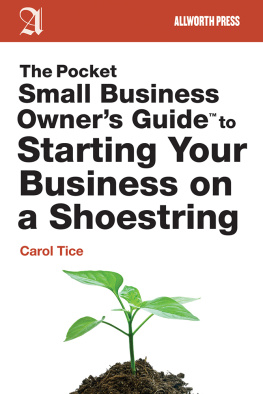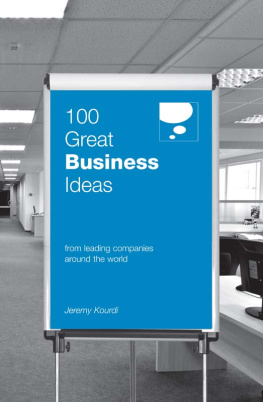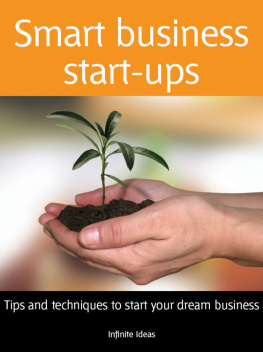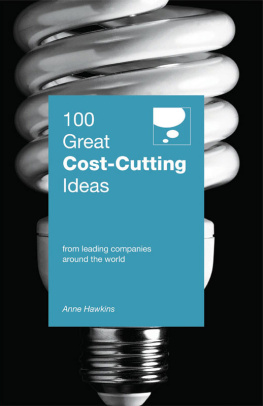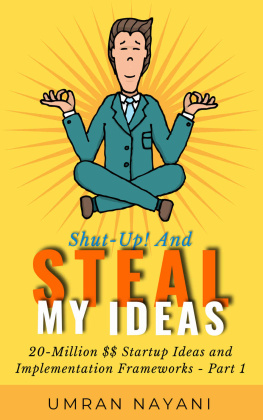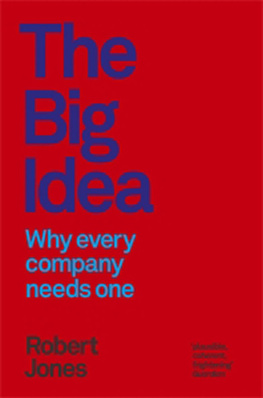HOW
THEY
STARTED
How 25 good ideas
became great companies
Carol Tice & David Lester

How They Started
Carol Tice and David Lester
This epub edition is published in 2012 by Crimson Publishing
Crimson Publishing, Westminster House, Kew Road, Richmond, Surrey TW9 2ND
Crimson Publishing, 2012
Epub edition 2012 ISBN: 978-1-78059-121-6
The authors have asserted their moral rights to be identified as the author of this work in accordance with the Copyrights, Designs and Patents Act 1988.
British Library cataloguing in Publication data
A catalogue record for this book is available from the British Library
All rights reserved under International and Pan-American Copyright Conventions. By payment of the required fees, you have been granted the non-exclusive, non-transferable right to access and read the text of this ebook on-screen. No part of this text may be reproduced, transmitted, downloaded, decompiled, reverse engineered, or stored in or introduced into any information storage and retrieval system, in any form or by any means whether electronic or mechanical, now known or hereinafter invented, without the express written permission of Crimson Publishing ebooks.
Epub file created by RefineCatch Ltd, Bungay
Contents
MANUFACTURING
MEDIA AND ENTERTAINMENT
SERVICES
INTERNET
FOOD AND DRINK
TECHNOLOGY
AMERICAN CLASSICS
We must first thank all the founders of the businesses featured who consented to give detailed, frank and insightful interviews about the very earliest days of their companies. Many revealed stories and information that have not been shared publicly before.
Many early-stage investors in these brands, founding team members, and other associates of the founders were also generous in sharing their memories and knowledge of the fledgling brands we feature in this book.
And we must also thank the companies, many of which are no longer run or owned by the original founders. These businesses, in numerous cases, provided additional supporting information and photography that they have kindly agreed to let us use here.
Finally, it is appropriate to thank those at Crimson Publishing, who have spent a considerable amount of time putting this book together.
Carol Tice, as co-author, has been instrumental in securing exclusive interviews and personally authored 11 chapters herself. Her dedication, resourcefulness and writing ability have ensured that the stories told here are unique and of the highest quality. But, as she says, My biggest thanks go to my husband Larry ... without you, nothing gets written.
Most of us have come across an idea we think would make an awesome business. That sixth sense, this-is-special moment when youre standing in a place thats crying out for a new restaurant/bar/whatever. Or you get that feeling of boiling frustration with a product or experience and think this should be so much better. Truth is, most of us dont act on those would-be killer thoughts.
This book is about the people who did. It tells the remarkable stories of people who had innovative ideas and built them into some of the hottest businesses on the planet. From afar, the scorching success these companies have had makes it look easy. Its not. The stories themselves are as compelling as most novels, with more twists and turns than most founders would have anticipated. Its probably better they didnt know what lay ahead, or they might never have started at all.
We decided to write this book to look much more deeply into why and how some of Americas most successful companies got started. It seems much harder to set something up from nothing than to take something thats working and grow it. And weve found it even more fascinating than wed expected.
How we selected the companies featured
Of all the many stand-out companies, how did we come up with this list? We started with the idea that we wanted to write about companies most people knew about. That way, the stories are more real, and also more enjoyable.
We knew we wanted a varietysome of Americas established corporate giants as well as plenty of more recent, fresh and disruptive startups, which will be more helpful to anyone currently starting up, or thinking about doing so. We also knew we wanted a selection of business typesfor all the opportunities and great startups in technology, this nation is home to many young, game-changing companies in other sectors, too. And we wanted founders from a variety of cities and backgrounds. Finally, we wanted entertaining storiesand we werent disappointed.
We hope that after reading this book, many of you will feel more confident about acting on an idea you might have to start or expand a small business. Thats part of the job we hope this book does.
But some of you will also be struck by how hard it can be to build a business to that level. And how risky. If some of you finish this book and decide that starting up might not be for you after all, then we will still have accomplished something worthwhile.
We dont believe everyone should start a business. We are often asked what it takes to start a company and make it a success. Part of what it takes is the resilience and commitment to get through the hard times that almost every startup will face along the way. Not everyone has that.
What else does it take? The stories here give us the same answer as the hundreds of other entrepreneurs we have interviewed or gotten to know. Mainly, it takes an innovative idea, passion and commitment. With enough of that, everything else should follow. The other essential qualities include a willingness to work unbelievably hard, getting at least comfortable with simple business finances, and the ability and determination to focus.
What about luck? Be lucky. Good luck. We use phrases like this all the time. How important is luck to a startup? You will surely make your own mind up as you read the chapters here. Our sense is that most entrepreneurs make their own luck. As the saying goesthe harder you work, the luckier you get. There are occasions when an entrepreneur gets lucky, but so long as you work hard and do the right things, at some stage luck is likely to happen to you, too. The people who appear luckiest are usually the ones who have looked around and seen an opportunity, and have worked their tails off to make it happen.
One surprising theme in the book is education and moneyand in some cases, the lack of both. Sure, both help, but not having a college degree or wealthy parents is no longer a barrier to starting your own business. Its the American Dreamif you work real hard, you can still come from nothing, build a business of your own, and make it successful.
For over a hundred years, this country has spawned bold and ambitious companies which have led the world in many different sectors. And arguably, this has never been more true than now, with American entrepreneurs leading the world in many fields. And that is no coincidence.
America is a truly great country for a startup. The culture is unusually open to new ventures, which means it is cooler and more acceptable to start a business here than in probably any other country. There is much better access to financing than anywhere else, toothe business angel and venture capital communities are better developed and more open to startups. There are many top-notch business schools and unrivalled supportmagazines, websites and blogs, books, and so on. And right now, America offers the biggest market in the world; all-accessible with a common language and robust infrastructure. Taken together, these are huge advantages. Against that, there is probably more competition here than any place else, too.


